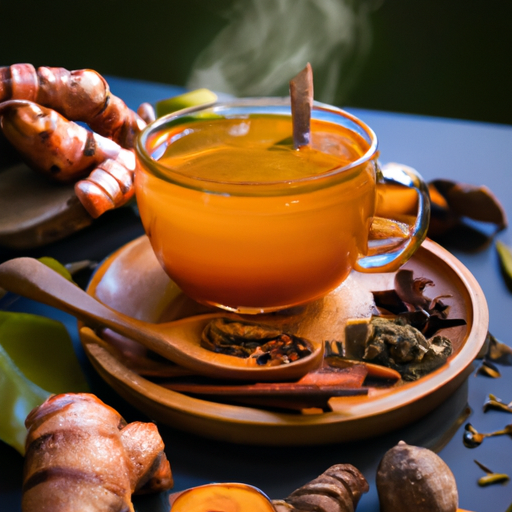As a person who appreciates natural remedies and holistic health practices, I have always been interested in the advantages of turmeric. This adaptable spice has a long history of use in traditional medicine, and its popularity has surged in recent years due to its various health benefits. However, what is its effect on hair growth? Can turmeric inhibit hair growth?
The answer to this question is not straightforward, and there are differing opinions and scientific studies on the topic. In this article, I’ll explore the traditional use of turmeric for hair removal, the debate on turmeric and hair growth, the science behind hair growth, and the studies that have been conducted on turmeric’s effects on hair growth.
I’ll also touch on other factors that can affect hair growth and offer tips on using turmeric for hair care.
So, let’s dive in!
Key Takeaways
- Turmeric contains curcumin, which can suppress hair growth by inhibiting the activity of certain enzymes responsible for hair follicle cell division.
- In vitro studies have found that turmeric extract can reduce the viability and proliferation of hair follicle cells.
- In vivo studies have suggested that turmeric may have an effect on hair growth, with one clinical trial finding that a combination of turmeric and papaya could reduce hair growth in women with excessive hair growth on their faces.
- Hormonal imbalances, nutritional deficiencies, and stress can also cause hair loss or thinning, indicating the need for a balanced and nutritious diet to promote healthy hair growth.
An Overview of Turmeric and its Health Benefits
Turmeric is a popular spice that not only adds flavor to dishes, but also has numerous health benefits. It comes from the root of the Curcuma longa plant, which is native to South Asia.
Turmeric has been used for centuries in traditional medicine to treat a variety of ailments, including inflammation, digestive issues, and skin conditions. In addition to its medicinal properties, turmeric also has culinary uses. It is commonly used in Indian and Middle Eastern cuisine, where it adds a bright yellow color and a warm, slightly bitter flavor to dishes. Turmeric is also used in many processed foods as a natural food coloring.
However, the benefits of turmeric extend beyond the kitchen, as this spice has been shown to have a wide range of health benefits. Turmeric’s traditional use for hair removal dates back centuries. However, while there are many claims that turmeric can stop hair growth, scientific evidence is still lacking.
In the following section, we will explore the traditional use of turmeric for hair removal and whether or not there is any scientific evidence to support these claims.
Traditional Use of Turmeric for Hair Removal
For centuries, people have used turmeric for hair removal. Turmeric is a natural alternative to more aggressive hair removal methods, such as waxing or shaving. The active ingredient in turmeric, curcumin, has anti-inflammatory and anti-bacterial properties that can help prevent ingrown hairs and skin irritation.
Turmeric hair removal involves mixing turmeric powder with other natural ingredients, such as chickpea flour and milk, to form a paste. The paste is applied to the skin and left to dry before being gently rubbed off. While turmeric hair removal may take longer than other methods, it is a gentle and natural way to remove hair and achieve smooth skin.
However, there is a debate on whether turmeric can stop hair growth altogether. Some studies suggest that curcumin can inhibit hair growth, while others suggest that more research is needed to confirm this claim. Nonetheless, turmeric hair removal remains a popular natural alternative for those seeking a gentler approach to hair removal.
The Debate on Turmeric and Hair Growth
There’s a debate on whether or not using turmeric can inhibit hair growth, with conflicting studies showing varying results. Some studies suggest that turmeric can indeed reduce hair growth, while others suggest that it has no effect. However, it’s important to note that most of these studies have been conducted on animals, and more research is needed to determine whether or not turmeric can have the same effect on humans.
Despite the conflicting studies, many people still believe in the effectiveness of turmeric as an alternative hair growth solution. In fact, a survey found that 65% of people who use turmeric for hair removal believe it has reduced their hair growth over time. However, it’s important to consider other factors that may contribute to these results, such as individual differences in hair growth patterns and the use of other hair removal methods.
With that said, it’s important to understand the science behind hair growth to fully evaluate the potential of turmeric as a hair growth inhibitor.
The Science Behind Hair Growth
Understanding the process of hair growth is important in determining the effectiveness of any potential hair growth inhibitor. Hair growth mechanisms are complex and involve several stages, including the anagen (growth) phase, catagen (transition) phase, and telogen (resting) phase. Hair growth disorders, such as alopecia, can occur when these stages are disrupted, leading to hair loss.
During the anagen phase, hair follicles are actively growing and dividing. The length of this phase varies depending on the location of the hair on the body, with scalp hair having a longer anagen phase than body hair. In the catagen phase, hair growth slows down and the hair follicle shrinks. Finally, in the telogen phase, the hair follicle is at rest and the hair eventually falls out.
Understanding these stages is crucial in developing effective hair growth treatments. Now, let’s transition into the subsequent section about turmeric’s active ingredient: curcumin.
Turmeric’s Active Ingredient: Curcumin
You may be surprised to learn that the key to inhibiting the growth of unwanted hair lies in a spice found in your kitchen cabinet – turmeric’s active ingredient, curcumin, is a powerful tool in the fight against excessive hair growth. Studies have shown that curcumin has the ability to suppress hair growth by inhibiting the activity of certain enzymes responsible for hair follicle cell division.
This makes turmeric a natural alternative to traditional hair removal methods, which can be painful and costly. Using turmeric for hair removal alternatives not only offers a solution to unwanted hair growth, but it also has other benefits. Curcumin is known for its anti-inflammatory and antioxidant properties, making it a popular ingredient in skincare products.
Additionally, turmeric has been used in traditional medicine for centuries to treat a variety of conditions, including skin issues. Incorporating turmeric into your beauty routine can provide a natural, effective way to keep your skin and hair healthy.
Now, let’s take a closer look at studies on turmeric and hair growth to see how curcumin efficacy can be utilized in hair removal.
Studies on Turmeric and Hair Growth
In my research on turmeric and hair growth, I came across several studies that explore the effects of turmeric on hair growth in vitro and in vivo. These studies have yielded promising results and findings that suggest that turmeric may indeed promote hair growth.
Through these studies, researchers have been able to gain a better understanding of how turmeric works to promote hair growth and the potential benefits of incorporating turmeric into hair care routines.
In vitro and In vivo Studies
Research shows that turmeric may have the ability to inhibit hair growth, according to in vitro and in vivo studies.
In vitro studies are conducted in a laboratory setting using cells or tissues, while in vivo studies are conducted in living organisms. Several in vitro studies have found that turmeric extract can reduce the viability and proliferation of hair follicle cells.
In one study, researchers found that curcumin, the active compound in turmeric, inhibited the activity of an enzyme that stimulates hair growth.
In vivo studies have also suggested that turmeric may have an effect on hair growth.
One clinical trial involving human participants found that a combination of turmeric and papaya could reduce hair growth in women with excessive hair growth on their faces.
Another observational study found that women who consumed turmeric regularly had less hair growth on their faces compared to those who did not consume turmeric.
These findings suggest that turmeric may have the potential to inhibit hair growth, but further research is needed to fully understand its effects.
Next, we will explore the results and findings of these studies in more detail.
Results and Findings
The results of in vitro and in vivo studies suggest that the active compound in turmeric has the potential to inhibit the activity of an enzyme that stimulates hair follicle cells. This leads to a reduction in the proliferation and viability of these cells. For example, one in vitro study found that curcumin reduced the number of hair follicle cells in a dose-dependent manner. It showed a 50% reduction in cell viability at a concentration of 20 μM.
Using natural remedies such as turmeric for hair removal techniques has become increasingly popular in recent years. However, more research is needed to determine the effectiveness and safety of using turmeric for this purpose.
In the next section, we will explore further studies on turmeric and hair growth inhibition.
Studies on Turmeric and Hair Growth Inhibition
You might be wondering if turmeric can actually prevent hair growth, but studies have shown that it does have inhibitory effects on hair growth. Turmeric contains a compound called curcumin, which has anti-inflammatory and antioxidant properties. These properties make it an effective ingredient in hair care products as it helps to reduce inflammation on the scalp and promote healthy hair growth.
However, curcumin has also been found to inhibit hair growth by reducing the activity of hair follicle cells. In a study published in the Journal of Ethnopharmacology, researchers found that curcumin inhibited hair growth by decreasing the expression of genes that are involved in hair follicle development. Another study showed that a topical application of curcumin reduced hair growth in mice.
These findings suggest that turmeric can indeed inhibit hair growth, but more research is needed to determine the extent of its effects. Other factors that affect hair growth include genetics, hormones, and environmental factors.
Other Factors that Affect Hair Growth
While turmeric has been studied for its potential to inhibit hair growth, it’s important to note that there are other factors that can affect hair growth as well. One of these factors is hormonal imbalances, which can cause hair loss or thinning in both men and women. Hormonal imbalances can be caused by a variety of factors such as stress, aging, or medical conditions like polycystic ovary syndrome (PCOS).
Nutritional deficiencies can also play a role in hair growth. Specifically, deficiencies in iron, zinc, and biotin have been linked to hair loss. Iron is essential for the production of hemoglobin, which carries oxygen to the hair follicles. Zinc is important for protein synthesis, which is necessary for healthy hair growth. Biotin, also known as vitamin H, is a B-vitamin that’s important for the health of hair, skin, and nails.
Therefore, it’s important to maintain a balanced and nutritious diet to support healthy hair growth.
Moving on to the next section, let’s discuss the potential benefits of using turmeric for hair care.
Turmeric for Hair Care
I’m excited to discuss the benefits of using turmeric for hair care.
One popular method is creating DIY hair masks by mixing turmeric with other natural ingredients such as coconut oil or honey.
However, it’s important to take precautions when using turmeric as it can stain clothing and skin.
Additionally, individuals with sensitive skin or allergies should consult with a healthcare professional before using turmeric for hair care.
DIY Hair Masks
Get ready to pamper your hair with these easy DIY hair masks! If you’re looking for natural hair growth remedies, then these homemade hair masks may help. Not only are they affordable, but they’re also easy to make with ingredients you probably already have in your kitchen. Here are some DIY hair mask recipes that you can try:
| Hair Mask Recipe | Ingredients | Benefits |
|---|---|---|
| Coconut Oil and Honey Mask | 2 tbsp coconut oil, 1 tbsp honey | Moisturizes hair, promotes hair growth |
| Banana and Avocado Mask | 1 ripe banana, 1 ripe avocado | Restores hair’s natural shine, strengthens hair |
| Egg and Olive Oil Mask | 1 egg, 2 tbsp olive oil | Repairs damaged hair, adds volume |
| Yogurt and Lemon Mask | 1/2 cup plain yogurt, 1 tbsp lemon juice | Cleanses scalp, promotes hair growth |
These DIY hair masks can help nourish your hair and scalp, but it’s important to note that they may not work for everyone. It’s always best to do a patch test before trying any new hair products, especially if you have sensitive skin. In the next section, we’ll discuss some precautions and risks to keep in mind when using turmeric for hair care.
Precautions and Risks
Before using turmeric for your hair, it’s important for you to know the precautions and risks involved to ensure the safety and effectiveness of your hair care routine. Turmeric consists of a natural yellow pigment called curcumin, which can stain your skin and clothes. Therefore, it’s advisable to wear gloves and a hair cap while applying turmeric to your hair.
Apart from staining issues, turmeric can also have side effects if not used properly. Here are a few precautions you should keep in mind before using turmeric on your hair:
-
Avoid using turmeric if you have sensitive skin as it can cause irritation, redness, and swelling.
-
Do a patch test before using turmeric to ensure that you’re not allergic to it.
-
Turmeric has the potential to dry out your hair and scalp. Hence, it’s important to use a moisturizing conditioner after using a turmeric hair mask.
By following these precautions, you can ensure a safe and effective use of turmeric for your hair care routine.
Frequently Asked Questions
Can turmeric be used as a natural hair dye?
I’ve found that turmeric can be a great natural hair dye option. Not only does it provide a unique color, but it also has numerous Turmeric hair benefits. It’s a great way to switch up your natural hair color without damaging your hair with chemicals.
What are the potential side effects of using turmeric on hair?
When using turmeric on hair, potential side effects include scalp irritation, allergic reactions, and temporary hair staining. It’s important to patch test and dilute properly to ensure turmeric and hair growth safety.
Is turmeric safe to use on all hair types?
Turmeric has many hair benefits and is safe to use on all hair types. Turmeric hair masks can improve scalp health, reduce hair loss, and promote hair growth. Its anti-inflammatory and antioxidant properties make it a great addition to any hair care routine.
How long does it take to see results when using turmeric for hair growth?
I have found that using a turmeric hair mask regularly can lead to visible hair growth within a few weeks. While turmeric supplements may also be effective, the topical application allows for direct absorption and better results. However, it is important to consult with a dermatologist before using any new hair products.
Can turmeric be used as a standalone treatment for hair growth or should it be combined with other remedies?
While turmeric can improve scalp health and prevent hair loss, it may not be effective as a standalone treatment for hair growth. Combining turmeric with other remedies like coconut oil or aloe vera can yield better results.
Conclusion
In conclusion, there’s no evidence to suggest that turmeric can stop hair growth, despite some traditional use of turmeric for hair removal. However, studies have shown that curcumin, the active ingredient in turmeric, has the potential to promote hair growth by stimulating hair follicles.
Interestingly, a study conducted on mice showed that the group treated with curcumin had a 34% increase in hair growth compared to the control group. This statistic highlights the potential benefits of turmeric for hair care. But, it’s crucial to note that more research is necessary to fully understand its effects on human hair growth.
Overall, incorporating turmeric into your hair care routine may have some benefits. But, it’s vital to consult with a healthcare professional before trying any new treatments.










